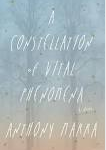 A village outside of Grozny, the Chechen capital, a hospital–one of the few buildings still standing in the bombed-out city–and the road between them provide the settings for Anthony Marra’s beautifully written novel “A Constellation of Vital Phenomena,” an exploration of the violence exacted on the people and culture of Chechnya by the First and Second Chechen wars. Akhmed, a villager, awakens one morning to find that the house of his neighbor and friend, the widowed arborist Dokka, has burned to the ground and Dokka has been taken, by the forces of the Russian Federation. Akhmed finds Dokka’s young daughter Havaa in the woods behind the house, and coaxes her into the city of Grozny, where he persuades a doctor, Sonja, to give them refuge.
A village outside of Grozny, the Chechen capital, a hospital–one of the few buildings still standing in the bombed-out city–and the road between them provide the settings for Anthony Marra’s beautifully written novel “A Constellation of Vital Phenomena,” an exploration of the violence exacted on the people and culture of Chechnya by the First and Second Chechen wars. Akhmed, a villager, awakens one morning to find that the house of his neighbor and friend, the widowed arborist Dokka, has burned to the ground and Dokka has been taken, by the forces of the Russian Federation. Akhmed finds Dokka’s young daughter Havaa in the woods behind the house, and coaxes her into the city of Grozny, where he persuades a doctor, Sonja, to give them refuge.
But Akhmed’s wife is bed-bound, and he must go home each night to tend to her, an 11-kilometer commute that he walks, circuitously so as to avoid checkpoints and land mines. Sonja and Havaa wonder each day whether he will return, Sonja because Akhmed, who is a doctor, has been helping her in the hospital, and Havaa because Akhmed is the last familiar face. Over the course of the novel’s next four days Akhmed returns three times. In his short nights at home he cares for his wife but also discusses events large and small with his friend Khassan. The friendship is critical to both of them. Khassan won’t speak with his own son, Ramzan, who has become an informer. Khassan, who was exiled to Kazakhstan with his parents (and virtually the entire population of Chechnya) as part of Stalin’s punishment of the Chechens for their support of the Nazis, and then returned with their bones, can’t forgive this betrayal.
Sonja is another person who has returned to Chechnya; in her case, it’s from studies in London, where she could have stayed, married, and avoided the tragedy of her country. But her sister, Natasha, was at home, and needed care after her own return from Europe. Natasha was forced into prostitution and became a heroin addict. She recovered enough to work with Sonja, but eventually the unremitting violence of the war, and the shortages of everything from painkillers to bandages, become too much for her. She leaves without a word, and Sonja spends whatever free time she has trying to piece together the hints of Natasha’s fate she finds or imagines.
“Your family isn’t your choice,” Sonja’s father told her once, long ago, “and without wanting to, she kept discovering what he had meant.” What it means to be a family, a tribe, a village, a city, are some of the themes Marra explores in this compelling novel, and one of the lessons he draws is that betrayal comes from the inside. Marra describes the violence circumstances and humans inflict on his characters, and relates a great deal of it, graphically. Each character faces uncertainty and danger daily, and the stress and demoralization their daily humiliations cause provide the story’s swift undercurrent.
At the same time, there’s humor – the dark kind (the last nurses remaining at the hospital, twins, solve every problem by suggesting amputation at the knee) and a sunnier kind that maintains that apothegms of the Koran can be confused with Bee Gees lyrics or that Havaa can grow up to be a sea anemonist. Every character, including the child Havaa, is fully drawn, whole, and distinguishable. “A Constellation of Vital Phenomena” is a wonderful novel that describes a terrible time. It’s not an easy book to read, and it is set in what may appear to westerners to be an obscure corner of the Caucasus. The Caucasus has been fought over for millennia, it’s a border between Muslim and Christian populations, and, because it depends from the Russian landmass between two large bodies of water, it’s an area that’s important to learn more about. “A Constellation of Vital Phenomena” is a good place to start. (If you want to know more of the history and geography, pair it with Neal Ascherson’s “Black Sea.”)
by Alexandra Bowie
Have a book you want me to know about? Email me at asbowie@gmail.com. Follow me on Twitter @abowie917.
